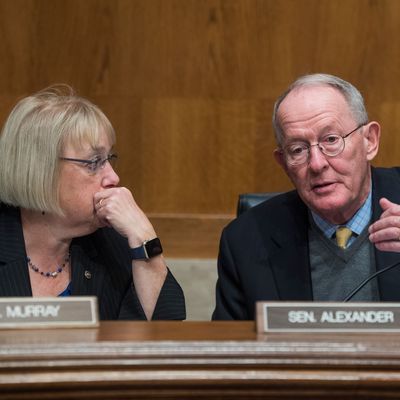
The one-two punch of a dismissal from Speaker Paul Ryan and an outright attack (just hours after he seemed to be supportive) from Donald Trump sealed the immediate fate of the bipartisan health-care-market stabilization proposal Senators Lamar Alexander and Patty Murray put together. Republican members of Congress aren’t going to put any energy behind enacting a measure that Donald Trump is calling an “insurance company bailout” and an effort to revive the “dead” Obamacare initiative, particularly with conservative activists and “base” voters still angry about the GOP’s serial failures to repeal the Affordable Care Act.
The main thing keeping the idea of a stabilization deal alive, if barely, is that the very conservatives who hate Obamacare and dislike bipartisanship are also extremely focused on the premiums being charged in Obamacare’s individual insurance markets, particularly as they affect the wealthier class of self-employed people who do not qualify for Obamacare’s insurance-purchasing tax credits. Trump’s cancellation of Cost-Sharing Reduction reimbursements, and the failure of Congress to reestablish them, will hit hardest precisely that segment of the insurance market. So there is residual Republican interest in doing something about CSRs even if it’s submerged in the usual rhetoric about bailouts and socialism.
We’re hearing some talk today about tweaking Alexander-Murray to make it more acceptable to conservatives: Senator Ron Johnson seems to think throwing in every Obamacare-undermining initiative within reach will do the trick. But it’s more likely to destroy Democratic support.
What Republicans really need is cover for supporting an action to keep down premiums that otherwise sounds too much like acceptance of Obamacare, which in some right-wing circles is the political equivalent of the unforgivable Sin Against the Holy Ghost. With Trump no longer offering such cover — and even if he did, would anyone trust him to maintain it after this week’s flip-flop? — the GOP needs some other way to get the job done. And already, according to Politico, they’re looking ahead to the giant must-pass spending bill due to come up in December.
The most likely scenario is to push the matter off and fold a yet-to-be-determined solution into a year-end package they hope will include some GOP concessions as well as Democratic perks. Such a strategy, they argue, would be less painful than voting on a stand-alone bill that conservatives view as a “bailout” for insurance companies — and a vote to “prop up” a law they’ve tried to dismantle for years.
Presumably the spending bill will have so many wide-ranging provisions that a little old health-care-market stabilization measure won’t attract nearly as much attention as it has out there on its own. With the only alternative being a government shutdown that will inevitably be blamed on the GOP, enough conservatives will go along to make it happen, it seems.
One dynamic that could have a significant effect on the possibility of something like Alexander-Murray becoming law is where the administration and the GOP congressional leadership are at the end of the year on the project of repealing and replacing Obamacare. If they are getting ready to launch another harpoon at that Great White Whale early in 2018, it might make Alexander-Murray more acceptable as a “temporary” measure that will become moot when a whole new health-care system is put into place (that’s how Trump was describing the bipartisan initiative earlier this week before he abruptly started attacking it). If, however, the repeal-and-replace drive has been postponed yet again because of internal GOP divisions or the failure to finish tax legislation on schedule, then Alexander-Murray could once again become toxic as a living symbol of Republican legislative fecklessness.
This messed-up environment has to be particularly frustrating for Lamar Alexander, a 77-year-old senator who has been a governor, a Cabinet member, and a two-time presidential candidate. He’s probably in his last term in the Senate. Waiting for his Republican colleagues to do the responsible thing on health care is not an ideal way to seal his legacy.






























